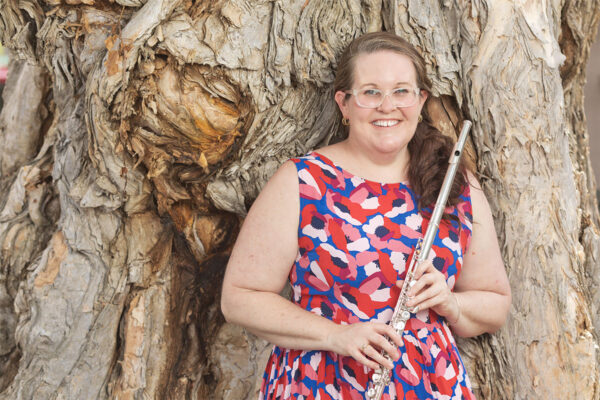For people with a disability, numbering one-in-five Australians, attending a music event or arts festival can be inaccessible and exclusionary.
This can occur by physical barriers such as a lack of wheelchair access, a shortage of seating or accessible bathrooms, or a lack of access provisions such as Auslan interpretation, captioning or Audio Description. Barriers can also include an absence of a quiet space for people needing to minimise excessive stimulus, a lack of provision for assistance animals, and attitudes of venue staff and security.
Access barriers can also start well before an event when potential patrons go online to find information about an event and seek to make bookings.
‘Online accessibility is often well below par,’ says Churchill Fellow Morwenna Collett who in 2019 set out to explore how the Australian music industry could include more disabled performers, staff and audiences.
‘Interested patrons can be unsure about what to expect at the venue and unable to make informed decisions about what, if any, access provisions will be in place. Many disabled punters have had bad experiences in the past, and if the access information isn’t clear, they may not feel it is worth taking the risk.
‘This means many people are missing out on great performances, while venues, promoters and performers are missing out on business and audiences.’
Morwenna’s Churchill Fellowship took her to the UK, Ireland and the USA where she explored accessible solutions with festival organisations, arts and music venues, arts and disability organisations, music organisations of all kinds, government organisations, access consultants, access service providers and Deaf and disabled musicians.
She forged important links with the UK body Attitude Is Everything (AIE), a global pioneer whose work continues to inspire her own. AIE has developed a Live Events Access Charter, an accreditation system that guides venues and festivals to improve access and inclusion for audiences, artists and staff. It has bronze, silver, gold and platinum levels and organisations can progress through the Charter stages over time.
Morwenna’s research was personal as well as professional. During her studies at the Queensland Conservatorium where she studied flute, disability became part of her life. She redirected her intended career to the management side of the industry, and now works as a consultant supporting event planners, venues and festivals.
‘While venue design and fit out is obviously important, access is about much more than capital works,’ Morwenna says.
‘Quite small adjustments can make a huge difference to people with disability. For example, having a lowered counter height with knee clearance at a box office or bar. Or a larger font size and strong colour contrast on printed material such as programs and menus.’
Of course, physical challenges will remain.
‘I do sympathise with venues with heritage constraints, who are starting from a very low baseline of physical accessibility. Or precincts with access challenges such as Brisbane’s Fortitude Valley. But where there’s a will there’s a way, and at the end of the day it comes down to intent and what venues choose to prioritise.’
In 2022, Morwenna was awarded a Churchill Trust Fellow Impact Funding Grant enabling her to undertake a feasibility study for the production of a National Live Music Accessibility Charter for the Australian music industry. This involved consulting with around 50 Australian organisations across areas such as music, live events, entertainment, government and disability, as well as working directly with Attitude Is Everything and an Australian steering committee of music and access experts.
The potential for implementing a Charter is great, and responses to the consultation sessions have been extremely positive – proving a demand to see this become a reality here in Australia.
‘This feasibility study will be used as a business case to seek funding for a further and final phase of this project, which would involve the development of a full Charter for use here in Australia and then rolling this out nationally,’ Morwenna explains.
‘The Charter will be used by music venues and festivals across Australia, to act as a roadmap and support to help them make improvements in their practices and fully embed inclusion.’
The broader arts industry is currently at a crossroads of great change, with electoral changes at both the federal and state (especially NSW) levels resulting in major restructures and enhanced funding for the arts and music.
Morwenna is clear about the importance of access and inclusion principles and is seeing this gain traction across the national arts landscape. She hopes that this next era for Australian arts and culture, driven by the new National Cultural Policy “Revive”, will mean that more people can access and participate in the arts across the country.
‘I’m grateful to the Churchill Trust for supporting my vision to explore what is needed next to develop a National Live Music Accessibility Charter. Feasibility studies are a notoriously difficult project phase to have funded, and this project has enabled me to advocate for change and build an evidence base and show demand for this concept. Now that the Proof of Concept has been sorted, I look forward to continuing to work with national colleagues and securing funding to bring this Charter to life.’
Impact Funding, a post Fellowship opportunity, supports selected Churchill Fellows to implement a project of their design to achieve further impact in their field.
